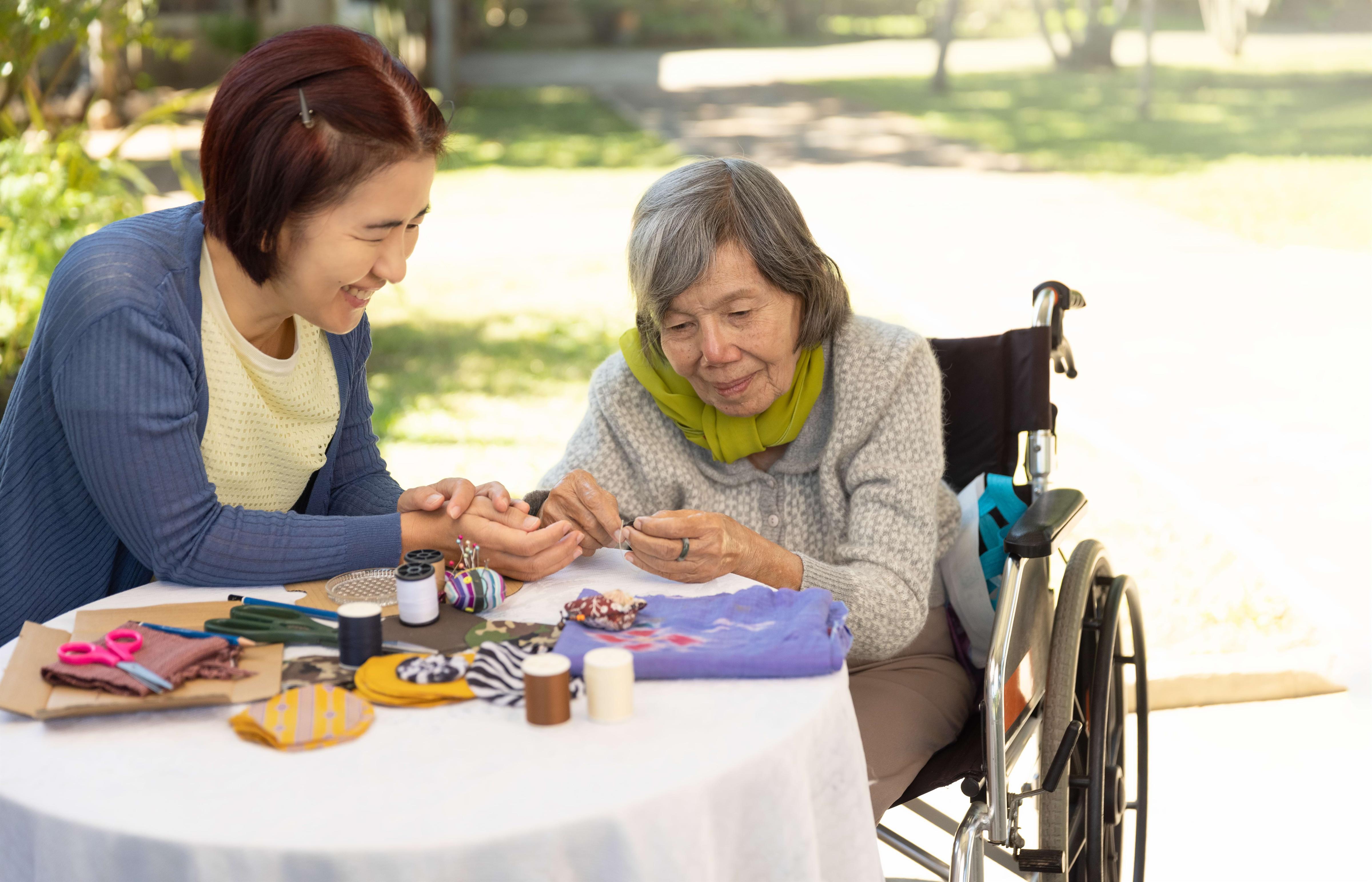What You Need to Know About Sundowning and Dementia
Reviewed by: Dr. Brindusa Vanta, MD
Millions of Americans aged 65 and over struggle with Alzheimer’s or other conditions associated with memory loss. These conditions can be challenging as these seniors can become quickly confused and agitated. For some seniors with dementia, the condition progressively worsens as they become older, and they may even experience periods of extreme confusion, anxiety or aggression, referred to as sundowning. Unfortunately, these episodes typically occur in the evening when caregivers themselves are exhausted and in need of a break.
According to the Alzheimer’s Association, as many as 20% of seniors struggling with Alzheimer’s disease experience some form of sundowning. However, the signs, symptoms and triggers of sundowning can vary from senior to senior. It’s important for caregivers to understand exactly what sundowning associated with dementia is and how it can affect their loved one.
This article details what sundowning is and offers tips to help caregivers support seniors struggling with sundowning. It also provides a list of resources pertaining to sundowning in dementia.
What Is Sundowning in Dementia?
Sundowning is a condition typically seen in seniors with dementia that causes periods of extreme confusion. These episodes begin in the late afternoon or early evening around sundown. This extreme confusion can cause seniors to act differently. For example, they may experience higher-than-normal levels of anxiety, aggression, restlessness and disorientation. Seniors may also display different behaviors, such as wandering, pacing, yelling and refusing to follow directions. Some even experience some forms of hallucinations or delusions.
Sundowning episodes can last several hours and impact the senior’s ability to sleep at night. Sundowning can occur several times a week or only occasionally. Additionally, it can worsen over time, especially as the senior moves into the later stages of dementia.
At What Stage of Dementia Does Sundowning Start?
Sundowning is most common among seniors in the middle or late stages of dementia. However, these episodes can occur at any stage. Caregivers and loved ones can consult with their doctor to make a proper diagnosis.
Is Sundowning Without Dementia Possible?
The majority of people who experience sundowning have been diagnosed with Alzheimer’s disease, dementia or other memory loss condition. However, seniors without dementia can experience sundowning episodes.
What Can Cause Sundowning?
There's limited information about the causes of sundowning, but age certainly plays a factor. However, known triggers may spur the onset of a sundowning episode, including:
- Extreme exhaustion
- Dim lighting
- Hunger or thirst
- Physical pain
- Boredom or restlessness
- Depression
- Side effects of prescription medication
- Unfamiliar location
- Disorientation
What Are the Signs and Symptoms of Sundown Syndrome?

Sundowning can impact the senior’s mood, reasoning, personality and memory. This can cause them to display behaviors that are uncharacteristic of them, such as:
- Pacing
- Rocking
- Yelling
- Extreme anxiety
- Agitation
- Aggressive behavior
- Trouble distinguishing between dreams and reality
- Delusions or hallucinations
If you notice your loved one experiencing any of these symptoms or extreme confusion in the late afternoon or early evening, they may be signs of sundown syndrome.
Are There Ways to Prevent Sundowning?
While sundowning triggers can vary between seniors, extreme fatigue is a major culprit. Some seniors' body clocks may be off, causing them to mix up their days and nights. You can do several things to avoid this level of fatigue and help your loved one fall asleep at night. Also, be aware of factors that can prevent your loved one from getting the sleep they need at night.
Below is a look at several do’s and dont’s that may prevent sundowning from occurring.
| Do's | Dont's |
|---|---|
| Do ensure your loved one has some exposure to the sun during the day. If they cannot go outside, then have them sit near a window. This practice may help to reset the senior’s body clock and help them sleep at night. | Don’t allow your loved one to drink too much caffeine, including coffee and soda, close to bedtime. Too much caffeine can make it harder to fall asleep. |
| Do ensure your loved one participates in some form of physical activity during the day, such as walking or chair exercises. Regular exercise may promote sleep at night. | Don’t allow your loved one to take too many naps during the day, especially naps close to bedtime. |
| Do make changes to ensure your loved one is getting enough sleep at night. For example, limit noise and other distractions. | Don’t allow your loved one to drink too much alcohol close to bedtime. This could hinder their ability to fall asleep. |
| Do help your loved one maintain a regular schedule, including set times for waking up, eating and bedtime. A regular schedule can help the body recognize when it’s time to go to sleep. | Don’t schedule too many activities during the day. While some exercise is good, overdoing it can cause extreme fatigue and trigger sundowning. |
Tips for Caregivers: How to Deal With Sundowning

As a caregiver, dealing with sundowning can be extremely challenging, especially when the symptoms last into the night and prevent you from getting a good night’s sleep. You can do several things to reduce the risk of sundowning or minimize its impact, including:
Create a Separate Environment for Daytime and Nighttime
If your loved one’s body clock confuses day and night, you can take steps to reset their clock. It’s important to create different environments for daytime and nighttime hours.
For example, during the day you can:
- Turn on the lights
- Open the blinds
- Turn on the TV
- Allow visitors
Closer to bedtime, however, it’s important to minimize as many distractions as possible. For example:
- Turn on soft, familiar music
- Close the blinds
- Turn the lights down low
- Minimize visitors and disruptions
- Reduce noise in nearby areas
Start the Bedtime Routine Early
Routine is a critical step in preventing the onset of sundowning. Starting this routine early can help the senior de-stress and prepare for bedtime. It can also keep their body clock on track. Start by removing all forms of caffeine and alcohol from the senior’s room. Then prepare them for bedtime by handling all the necessary hygiene and dressing needs. Finally, you can transition the senior’s room to its nighttime environment to help prepare them for bed.
Validate Senior’s Feelings and Distract
It can be difficult not to become frustrated when a loved one is experiencing sundowning. Do your best to remain calm and take steps to validate the senior's feelings. For example, if they're confused, you can validate their feeling of uneasiness and explain where they are.
Once you validate their feelings, move quickly to distract them. A good way to spur this distraction is to provide them with familiar things, such as photographs, a special blanket or favorite music. You can play a TV show if it’s helpful, but keep the volume to a minimum and avoid anything that can make them anxious, such as the news.
Check With Your Loved One’s Doctor
If your loved one is experiencing sundowning, it’s a good idea to discuss it with their doctor. Sundowning can be a side effect of some prescription medications. The doctor may be able to help you determine if any medicine or other physical condition is causing sundowning.
Resources for Caregivers of Seniors With Memory Loss
There are several free online and local resources for caregivers of seniors living with Alzheimer’s, dementia or other memory loss issues. Below is a look at the top resources available.
| Resource | Contact | Service |
|---|---|---|
| Alzheimer’s Association | (800) 272-3900 | The Alzheimer’s Association provides valuable information regarding the latest research and resources for seniors living with dementia and their loved ones. Local chapters throughout the country host educational and awareness events and provide information and referral services. |
| National Institute on Aging | (800) 222-2225 | The National Institute on Aging is a division of the National Institute of Health and focuses on research and development to improve the health of seniors. It offers free resources to help seniors and their loved ones cope with many senior living issues, including sundowning. |
| Local Area Agency on Aging | (800) 677-1116 | Your local Area Agency on Aging can be an invaluable resource for seniors, family members and caregivers. Many agencies provide information and referral services and host various educational workshops and lectures. These agencies also help connect seniors with eligible benefits and services in their area. |
| Caregiver Action Network | (800) 272-3900 | The Caregiver Action Network is specifically for family members and other caregivers who provide support to those with chronic conditions, such as dementia. It’s a nonprofit organization that provides free educational resources and peer support. Its resources include online tips, caregiver advice, educational and support videos and printable documents. |
| National Aphasia Association | (800) 922-4622 | The National Aphasia Association provides resources and online educational tools to seniors, and caregivers, who are struggling with the impact of aphasia due to Alzheimer’s. The association also hosts virtual events and can connect seniors and their family members to local resources and affiliates as needed. |
| Alliance for Aging Research | (202) 293-2856 | The Alliance for Aging Research manages numerous senior-related initiatives, including Aging in Motion. It provides a vast library of educational videos that offers tips for preventing and managing various senior-related issues, including Alzheimer’s and dementia. It also hosts a variety of nationwide events throughout the year to bring awareness to senior issues. |
| National Council on Aging | (571) 527-3900 | The National Council on Aging is a nationwide organization that provides seniors and their loved ones with informational resources pertaining to healthy senior living. The organization can also help seniors explore and locate benefits in their local area that can help them maintain healthy and meaningful lives. |


